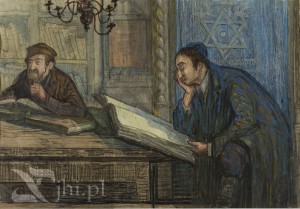George Clooney and editors are reportedly in the final phases of editing Monuments Men, a film about the recovery of Nazi looted art. With an unprecedented profile and level of publicity for an early 2014 release, the early November news regarding the discovery of the Gurlitt Munich trove was tremendously serendipitous. The combination of news and publicity has brought recognition of and interest in issues of Nazi looting and art crime to an all-time high. In the space created by the vast interest in these two stories, I believe there is room created for a number of other lesser known but interesting narratives of Holocaust era lost and looted art, including the Moshe Rynecki story. Rynecki was a Polish-Jewish artist (not a dealer or collector), who was a prolific painter of the Jewish community in the interwar years (it is estimated he had created 800+ paintings, sketches, and sculptures before the outbreak of the war), and perished in the Holocaust. While the story has its roots in the Second World War, it is now also a 21st century story about a great-granddaughter’s efforts (mine) to find her family’s lost art legacy.
As those of you who have been following the story for awhile know, a few weeks ago (after many years of pleading) I received an email from the Jewish Historical Institute (ZIH) in Warsaw with photos of 17 of the 52 pieces by my great-grandfather in their possession. Here is another one of those pieces. I believe ZIH titled it, “Zydzi nad ksiegami,” [translation guess: Jews of Books].
This piece reminds me of so many others: The men sitting at the table, hunched over their books, head in hand, more books stacked on shelves behind them, and the light fixture with its lovely and graceful arms. I am again reminded of the power of my great-grandfather’s paintings to lend a glimpse into a world he knew well, but which was destroyed in the Second World War. His art is more than just a legacy for my family – I am passionate about sharing it with others.
Yesterday I received an email from a woman who had shared the small art catalog of my great-grandfather’s works with a Holocaust survivor. She wrote, “he loved the book of paintings…[he] sat alone at the window of the apartment looking at it by himself for a long time.” And that really, is what it’s all about – sharing the art.
